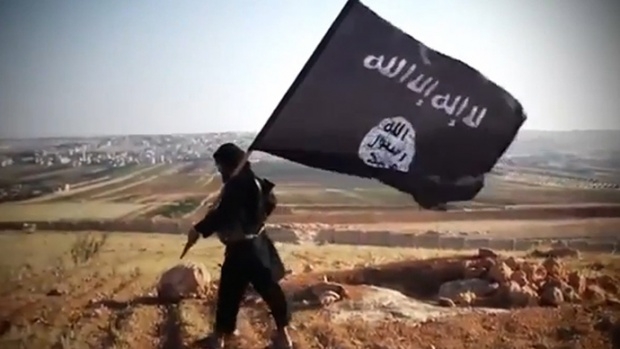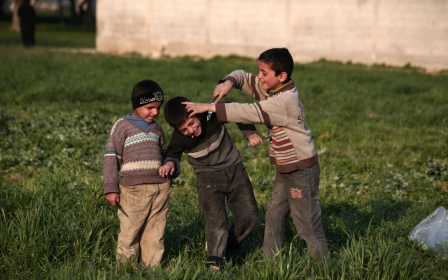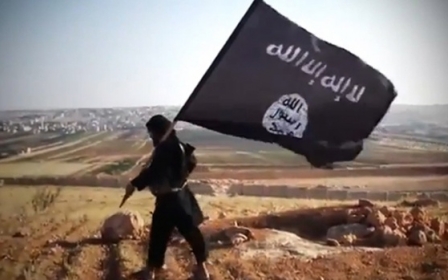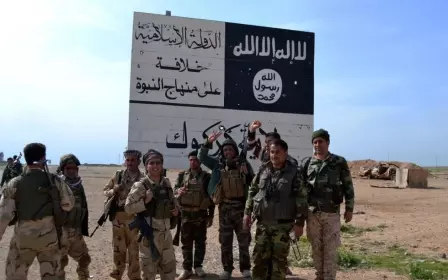An emirate only by name

The Islamic State (IS) is at the doorsteps of Lebanon. Reportedly 700 IS fighters are Lebanese citizens, building up on their country’s mountainous eastern borders, preparing to march on a fabled country once called the “Switzerland of the East.”
In March 2015, a military court issued verdicts against 17 Lebanese citizens for membership in IS. Six were already in custody but 11 were on the loose, threatening to blow the country apart. Although the extremist group is gaining ground throughout the Middle East, something tells the people of Lebanon that IS will halt at the gates of Beirut and never penetrate their picturesque city.
Last February, Lebanese security announced that IS was preparing to invade Lebanon. The “Lebanon Emirate” would be run by IS commander Khalaf al-Zeyabi Halous (Abu Musaab Halous) a 35-year old Syrian militant who played a fundamental role in IS’ capture of Raqqa last summer. At the Romieh Prison just outside Beirut, a picture was taken of extremist inmates with an IS flag hanging from a bookshelf behind them. The prison itself, a topic of grave concern, is becoming hauntingly similar to Camp Bucca in Iraq, the US jail that housed thousands of Salafis and introduced them to each other, including Abu Bakr al-Baghdadi and Abu Mohammad al-Golani, the head of the al-Nusra Front.
Lebanese premier Tammam Salam acknowledged that IS is already “alive” in Lebanon and that if it manages to invade “it will impose its extremism everywhere!” After controlling large parts of Syria and Iraq last summer, the militant group branched out into Egypt, striking at its military in the Sinai Peninsula, and Libya, recruiting thugs once on the payroll of Muammar al-Gaddafi.
The Nigeria-based militant group Boko Haram also pledged allegiance to IS this March. IS militants have threatened to reach as far as Spain and to conquer Rome. Beirut, of course, is much closer geographically and easier - thanks to the mayhem flooding into Lebanon from the four-year war in Syria.
When the Syrian revolt started in 2011, Lebanese officials warned that Syrian rebels would seek to open a new front in Lebanon. If they succeed in Damascus the obvious next step would be to take on Hezbollah. If they fail at home, however, fleeing persecution inside Syria they would take refuge in one of Syria’s neighbours. The Turks would likely not allow defeated extremist militants back into their territory. The obvious alternative would be Iraq and Lebanon. The former already has a strong base for Sunni extremism and last summer IS took over the strategic cities of Mosul and Tikrit.
It was only a matter of time before al-Qaeda made its debut in Lebanon. This happened first with the al-Nusra Front, the Syrian branch of al-Qaeda, which began attracting fighters from Jund al-Sham and Fatah al-Islam, two Islamic militias that have thrived in Lebanon’s Palestinian camps for an entire decade. Both wanted to break Hezbollah and to create a Sunni counterbalance to Shiite arms. Both were based in Ain al-Hilweh, a condensed and poor refugee camp southeast of the port city of Sidon. Those camps were filled with impoverished families, mosques, powerful clerics, and plenty of arms.
Salafi extremists regard Shiites, Alawites and Christians as heretics who ought to be put to the sword, based on a controversial 14th-century verdict by the ideological founder of modern jihadism, Ibn Taymiya. A Sunni-Shiite armed conflict in Lebanon would weaken and eventually incapacitate Hezbollah’s massive arsenal and serve a deadly blow to Shiite Iran.
According to the pro-Hezbollah Lebanese daily al-Akhbar, the Ain al-Hilweh cell of the al-Nusra Front’s Lebanon branch has 150 members. Among its top commanders are three Palestinians: Tawfiq Mohammad Taha, Ziad Ali (Abu Na’aj), and Haitham Mahmud Mustapha. Others include the Lebanese Bilal Bader, Usama Shihabi, Naim Ismail Abbas, and explosives expert Mohammad Ahmad al-Douakhi. They now dominate approximately 70 percent of Ain al-Hilweh, and are increasing in both membership and arms.
The second cell is situated in the northern Lebanese city of Tripoli, consisting of 400 heavily armed fighters. Smaller splinter groups can be found all over Lebanon, affiliated, or in the process of affiliation either with al-Nusra or IS. One is Soukour Akkar (Akkar Hawks), founded originally in Baalbek. Another cell was founded in Arsal, a sleepy village of 40,000 residents in Lebanon’s Bekaa region.
Among the rising Sunni extremist figures involved in the operations of al-Qaeda or its proxies in Lebanon are non-Lebanese militants Mohammad Douek from Morocco, the Saudi Abdullah al-Hittarand Ashraf al-Ghamidi, the Syrian Mohammad Mahmud Khalaf, the Tunisian Zuhdi Mohammad al-Qawadri, the Egyptian Mohammad Ahmad al-Masri - known as Abu Hudaifa, the Kuwaiti Jihad al-Bayani, the Bahraini Seif Yusuf Bin Seif, and a Chechnyan combatant known by the name of Aslan.
The first major IS attack came in August 2014 weeks after the group occupied al-Raqqa in Syria. IS fighters struck in Arsal, killing 20 soldiers and capturing another 20. In October, they attacked two Hezbollah positions at the border towns of Brital and Nahleh, killing three people. In September IS beheaded two of its Lebanese soldiers held captive, sparking outrage throughout the country. A video on Twitter warned Lebanese Sunnis that they would “pay a price” for not supporting IS.
In January 2015, IS claimed a double suicide attack at a café in Tripoli that killed another eight Lebanese, this time in the Alawite neighbourhood of Jabal Mohsen. Al-Qaeda’s black flag began to appear at demonstrations in Tripoli and Beirut. IS graffiti at a church in Tripoli read: “The Islamic State will break the cross.”
Why then hasn’t IS overrun cities like Tripoli and Sidon? One reason is that Hezbollah chief Hasan Nasrallah is trying hard to avoid such a battle at home. Sectarian tension is razor thin in Lebanon. Any confrontation, even self-defence, would automatically morph into a Sunni-Shiite war. Hezbollah - already under fire for its involvement in Syria - would be accused of butchering Sunnis in Lebanon. That would automatically generate reprisal attacks that would drag both groups into never-ending clashes and a war of attrition.
Ultimately, such a war would drain Lebanese Salafists, al-Nusra, and Hezbollah. The Shiite party has already bitten off more than it can chew. It has stretched itself thin fighting rebels in Syria, Salafis at home, and still stationed throughout South Lebanon, fearing any attack from Israel. It has neither the will nor the manpower, for yet another war.
The same cannot be said of regional players who would die to see Hezbollah’s demise, even if at the hands of Salafi militants. If IS manages to draw Hezbollah to a battle that either breaks or weakens it, Tel Aviv would be happy - and certainly, so would Saudi Arabia. Hezbollah would be too occupied fighting IS to carry out the aim for which it was originally established: exporting the Shiite Islamic Revolution to other Muslim states in the Arab world like Bahrain, Yemen or Saudi Arabia itself. All of these actors would wait for one side to eliminate the other, knowing that both would emerge battered and weak. It is similar to how the US stood by and watched the Iran-Iraq war of the 1980s, hoping that it would either rid them of Ruhollah Khomeini or Saddam Hussein.
If IS does try to take on Hezbollah, Nasrallah would probably avoid letting his own troops do the fighting. He would ward off Salafi attacks through proxy Sunni allies. While the war on Hezbollah would undoubtedly attract many disenfranchised Sunnis, the same wouldn’t happen if IS struck at the Lebanese army. This after all is the public hero of all Lebanese, regardless of their sectarian affiliations.
Last year, Lebanon received $100 million worth of military aide from the US, and $25 million worth of weapons, to help its army fight off ISIL. Despite the assistance, the Lebanese army remains largely unprepared for such a confrontation. The Iraqi army stood at 350,000 soldiers, and had cost $41.6 billion to train and equip since 2011. It collapsed at the feet of IS in just 100 days last summer. The scene would be just as bad, if not worse, in Lebanon.
The country is already in shambles because of the war in Syria. Its GDP growth has dropped from 10 percent in 2009 to just 0.9 percent in 2013, with the UN estimating $7.5 million in economic loss due to the war. Demographically 1.2 million refugees have streamed into Lebanon and settled, most being Sunni Muslims.
This is dramatic for a country whose total population is no more than 4.4 million. Poverty and lack of education might lead them toward IS one day. Many are located in camps packed with arms and charismatic Salafi clerics. It would be very easy to brainwash them. Nobody knows how many will stay behind in Lebanon after the war ends in Syria.
On the other hand, like Nasrallah, IS is also unprepared to go all out on Lebanon. When local militias asked for arms and men to fight in Egypt and Libya, Abu Bakr al-Baghdadi refused, offering lip service and sending technical advisers instead. He too didn’t want to take on more than what he could handle - US-trained rebels around Raqqa, Iraqi troops in Tikrit, and American airplanes in the skies of both Iraq and Syria.
If the decision was not his, then it was probably made by his top Iraqi lieutenants, who realise from their Saddam days that it is military madness to try and tackle more than what is possible. He hasn’t been swept away by the pledges of support he got from Libya and Egypt. Otherwise, al-Baghdadi might have committed the grave error of leaving his main base in Syria unchecked and prone to invasion by one of his many enemies. Few leaders have done that when their proxies seek their assistance, often treating it as a golden opportunity to grab new territory, bolster traditional allies, or topple arch-foes.
Clearly from the restraint in Lebanon, the hot-headed caliph is not as erratic as many originally thought him to be. He is creating affiliates and provinces for IS - literarily franchising the extremist group - without firing a bullet or spending a penny. For now the “Lebanon franchise” by name is enough publicity for IS - there really is no rush to make it a happen.
- Sami Moubayed is a Syrian historian and former Carnegie scholar. He is founder of the Damascus Foundation for Historical Studies and author of “Syria and the USA” (IB Tauris, 2012).
The views expressed in this article belong to the author and do not necessarily reflect the editorial policy of Middle East Eye.
Photo: An IS fighter carries the militant group's flag (AA)
New MEE newsletter: Jerusalem Dispatch
Sign up to get the latest insights and analysis on Israel-Palestine, alongside Turkey Unpacked and other MEE newsletters
Middle East Eye delivers independent and unrivalled coverage and analysis of the Middle East, North Africa and beyond. To learn more about republishing this content and the associated fees, please fill out this form. More about MEE can be found here.





